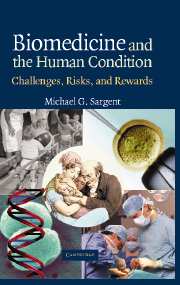Book contents
- Frontmatter
- Contents
- Preface
- 1 Challenges, Risks, and Rewards: Learning to Control Our Biological Fate
- 2 Learning to Breed Successfully
- 3 How Life is Handed On
- 4 Cells in Sickness and Health
- 5 Experiences in Utero Affect Later Life
- 6 Infection, Nutrition, and Poisons: Avoiding an Unhealthy Life
- 7 Signs of Ageing: When Renovation Slows
- 8 Cancer and the Body Plan: A Darwinian Struggle
- 9 Fighting Infection
- 10 Are Devastating Epidemics Still Possible?
- 11 Discovering Medicines: Infinite Variety through Chemistry
- 12 Protein Medicines from Gene Technology
- 13 Refurbishing the Body
- 14 Living with the Genetic Legacy
- 15 Epilogue: Signposts to “Wonderland”
- References
- Index
5 - Experiences in Utero Affect Later Life
Published online by Cambridge University Press: 06 August 2009
- Frontmatter
- Contents
- Preface
- 1 Challenges, Risks, and Rewards: Learning to Control Our Biological Fate
- 2 Learning to Breed Successfully
- 3 How Life is Handed On
- 4 Cells in Sickness and Health
- 5 Experiences in Utero Affect Later Life
- 6 Infection, Nutrition, and Poisons: Avoiding an Unhealthy Life
- 7 Signs of Ageing: When Renovation Slows
- 8 Cancer and the Body Plan: A Darwinian Struggle
- 9 Fighting Infection
- 10 Are Devastating Epidemics Still Possible?
- 11 Discovering Medicines: Infinite Variety through Chemistry
- 12 Protein Medicines from Gene Technology
- 13 Refurbishing the Body
- 14 Living with the Genetic Legacy
- 15 Epilogue: Signposts to “Wonderland”
- References
- Index
Summary
A revolutionary nursery for their progeny in an internal organ is the immense evolutionary advance by which mammals escaped the desperate profligacy of lower vertebrate life. By abandoning yolk as a food for the embryo and becoming dependent on the mother for nutrition through the placenta, mammals made a huge step forward in reproductive efficiency. For human parents who invest such hope in every pregnancy, the possibility that a mother may carry to term a child burdened with an imperfection makes procreation a poignant lottery. The development of the foetus may be affected adversely by poor nutrition, premature birth, or genetic damage, and consequently the child's true physical potential dictated by the genes may not be not realised. At birth, most of the genetic program is completed, but an infant's growth continues for many years after birth, following a trajectory set early in life.
The Perfect Nursery?
Imagine the reproduction of fish and frogs. Eggs are laid in thousands; the likelihood of fertilisation is low; the progeny are easily eaten, infected, or poisoned. However, if more than a few are fertilised and survive, the species prospers. Reproductive duties complete, the parents of these lucky few abandon their progeny to the lonely battle for survival. Mammals avoid this wasteful lottery. Eggs are fertilised with more certainty, and the resulting embryo is raised in an extraordinary high-grade “nursery,” in relative safety.
- Type
- Chapter
- Information
- Biomedicine and the Human ConditionChallenges, Risks, and Rewards, pp. 90 - 111Publisher: Cambridge University PressPrint publication year: 2005



